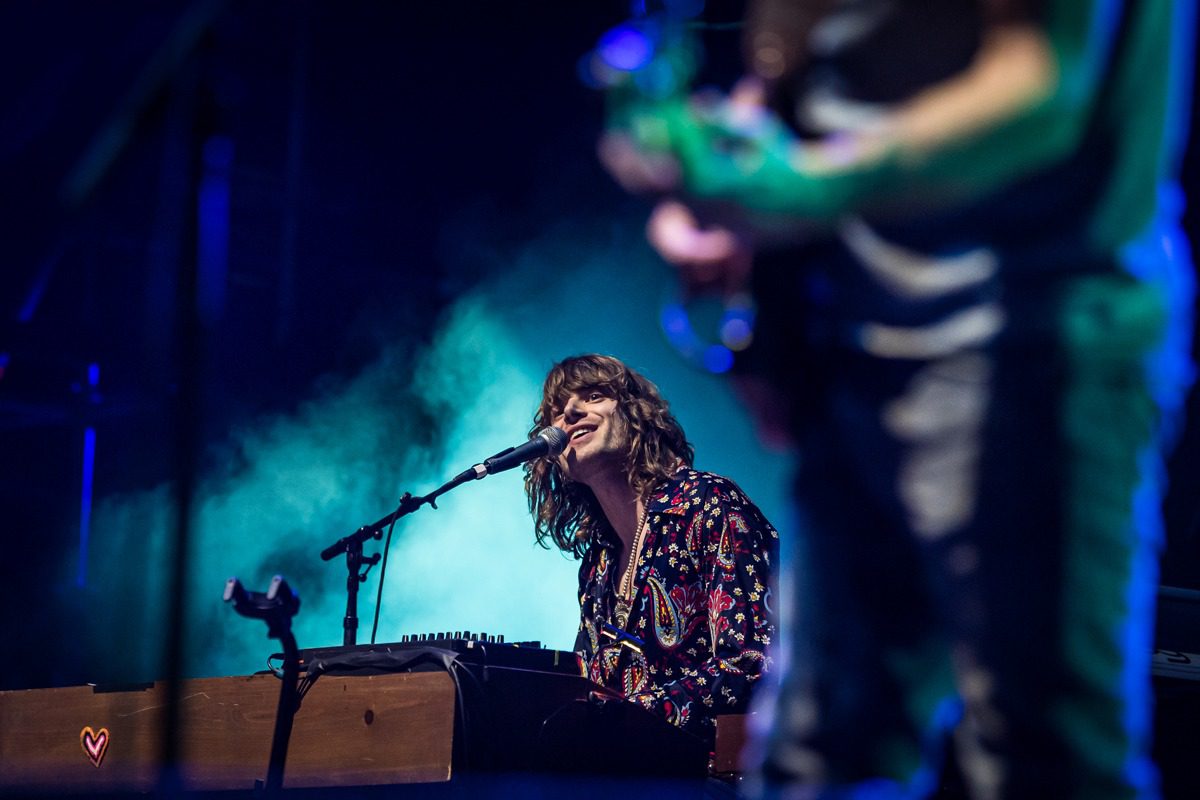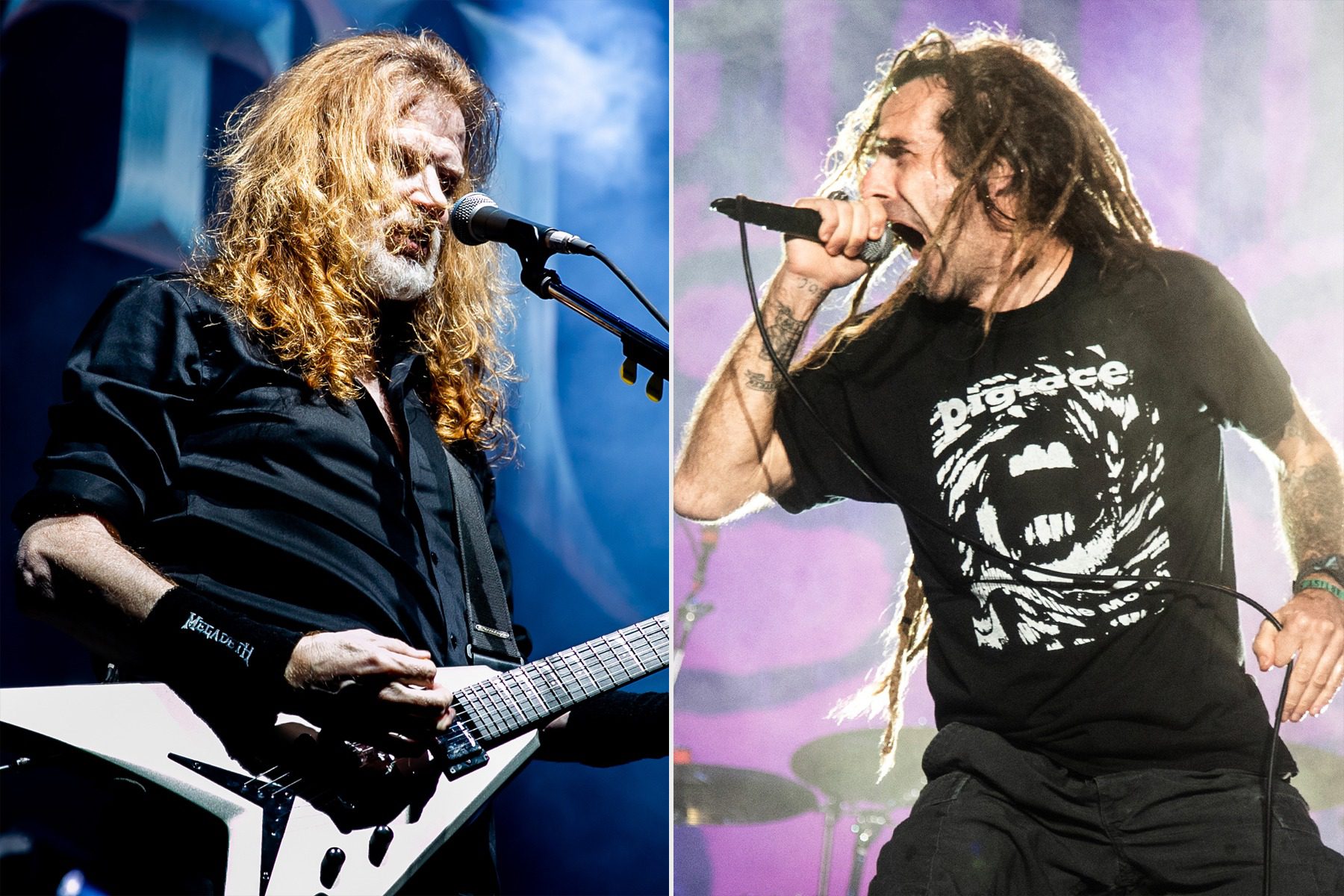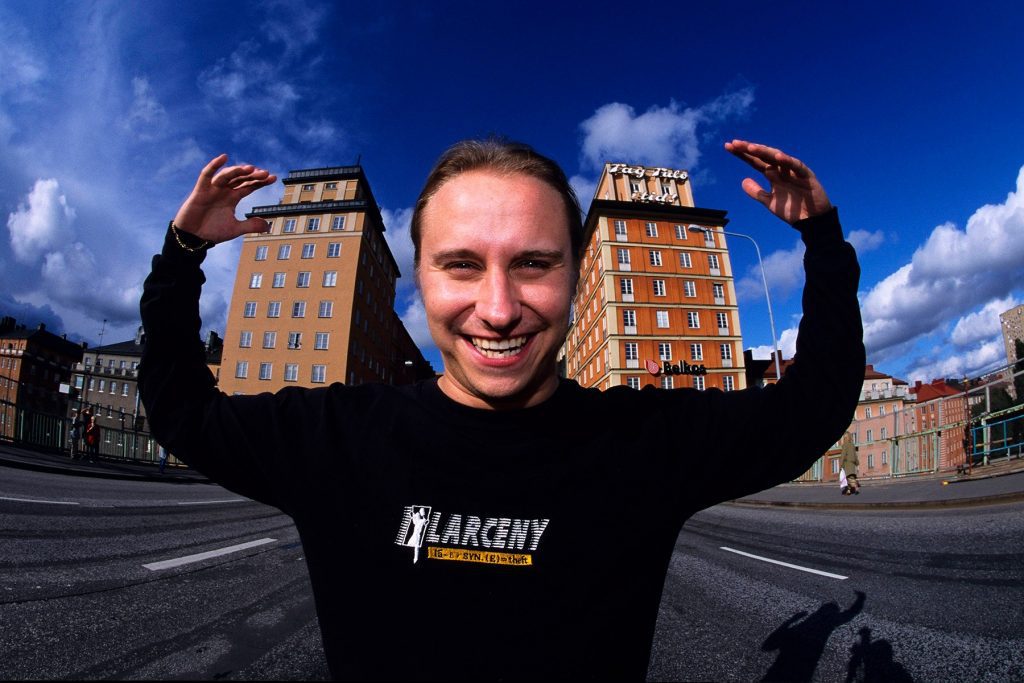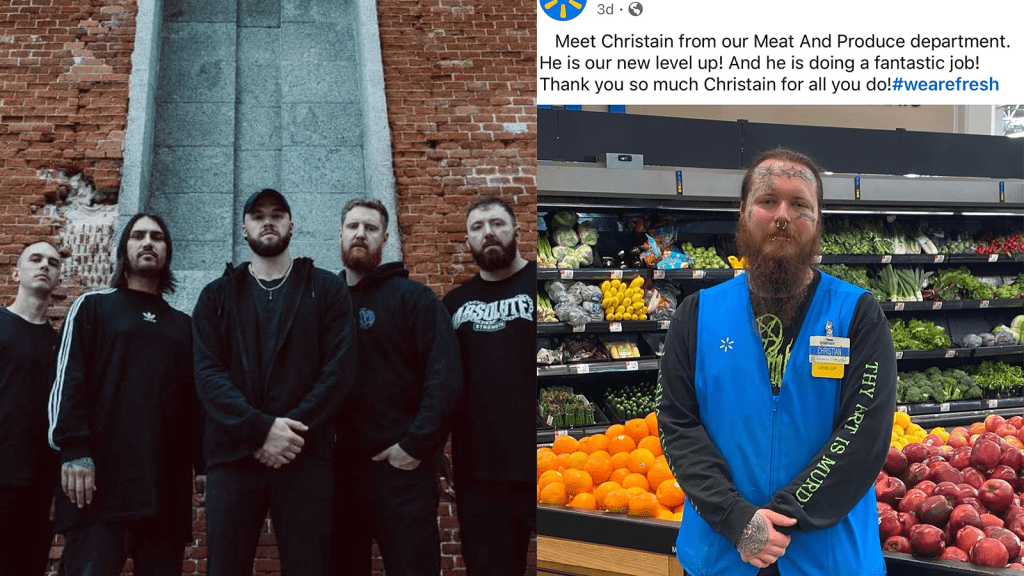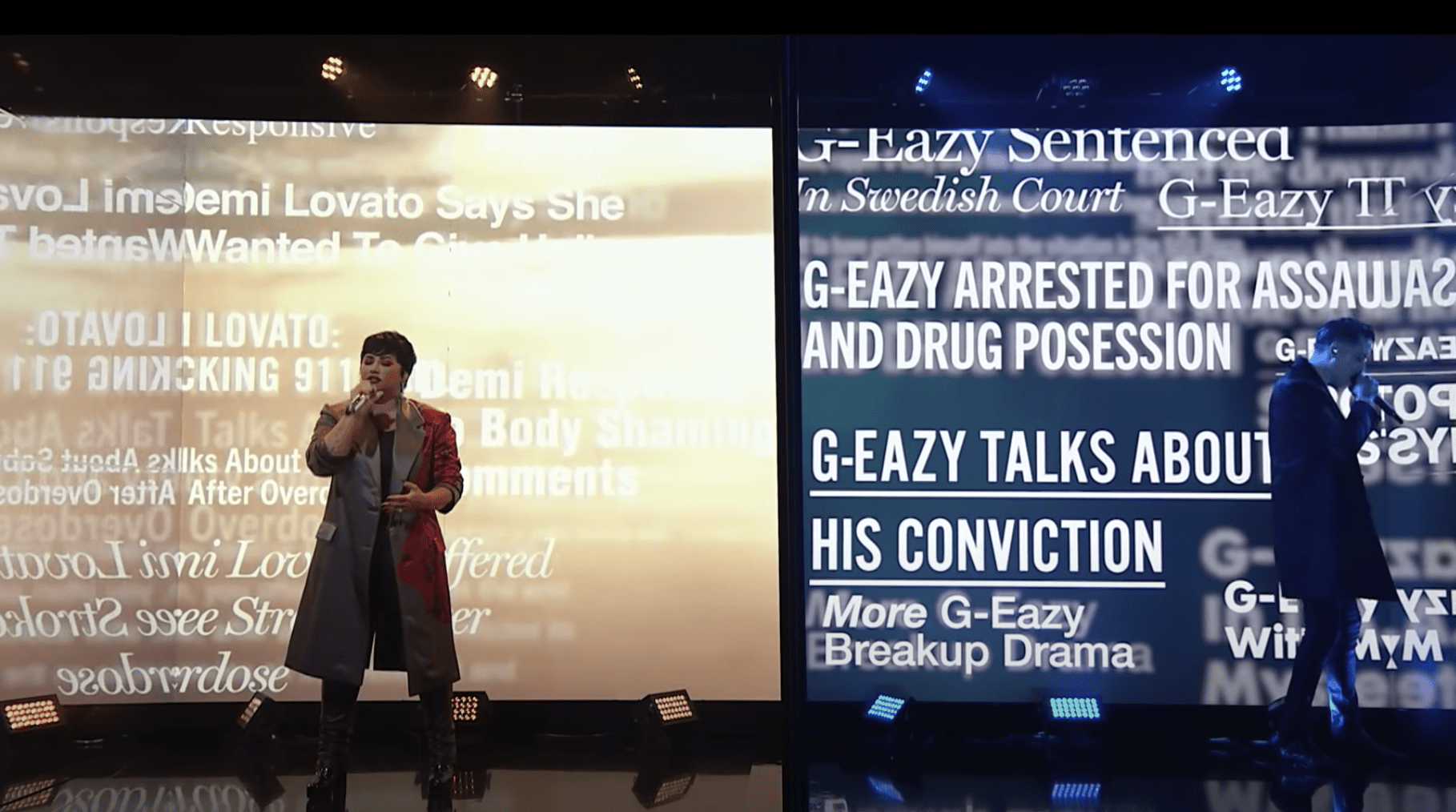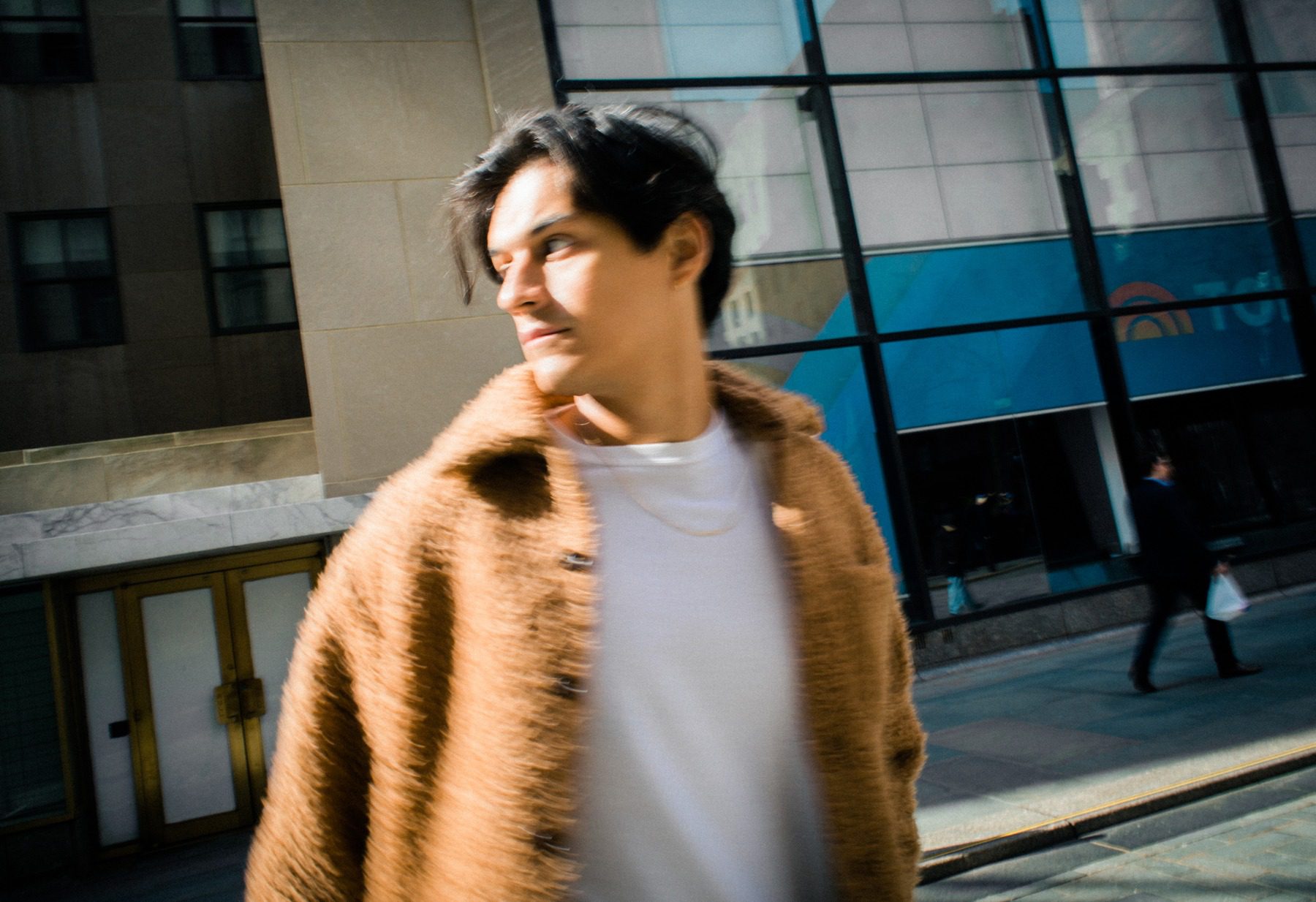
‘I Can Say How I Feel, No Matter What’: The Liberation of Omar Apollo
Here he comes now, sauntering down the sidewalk in L.A.’s Westchester neighborhood, a few blocks from LAX — iced coffee in hand, friend by his side, and a Whitney Houston song on his mind. “I’m saving all my love for youuuu,” he hum-sings with effortless soul and a soft smile, a friendly giant at 6’5″. He introduces himself as he approaches: “Hi, I’m Omar.”
Omar Apollo leads us into an unassuming house that looks like the venue for a typical college party inside, with strange doodles on the wall, misplaced Xbox controllers, and a car door leaning against the kitchen bar. For now, he’s dressed casually, in gray sweatpants, a dark flannel over a white tank top, and Birkenstock clogs. It’s about 11 a.m.; in a couple hours, he’ll be shooting the video for “Tamagotchi,” the last single he’s releasing before the album he sees as his magnum opus, Ivory, arrives on April 8.
With its bouncy Neptunes beat, flirty, bilingual lyrics, and effortlessly catchy chorus (“You with somebody, or are you cool?/I want your body, you want me too”), “Tamagotchi” is a perfect example of the qualities that have made Apollo, 24, one of the most exciting artists of his generation. A self-taught Mexican American musician with a remarkable vocal range, he saw nearly overnight success after uploading a smoldering, D’Angelo-style R&B song called “Ugotme” onto Spotify in 2017, connecting with a global audience thanks to the power of playlisting. Since then, he’s collaborated with everyone from funk king Bootsy Collins to the Strokes’ Albert Hammond Jr. to Spanish rap star C. Tangana (the latter earning him a Latin Grammy Record of the Year nomination); won comparisons to Prince and Frank Ocean that, amazingly, don’t feel hyperbolic; and built a devoted, diverse base of Gen Z fans, largely Latino, often queer, who feel represented by his work.
blogherads.adq.push(function () {
blogherads
.defineSlot( ‘medrec’, ‘gpt-dsk-tab-article-inbody1-uid0’ )
.setTargeting( ‘pos’, [“mid-article”,”mid”,”in-article1″,”mid-article1″] )
.setSubAdUnitPath(“music//article//inbody1”)
.addSize([[300,250],[620,350],[2,2],[3,3],[2,4],[4,2],[640,250]])
;
});

“You with somebody, or are you cool?/I want your body, you want me too”
SINNA NASSERI FOR ROLLING STONE
One thing Apollo hasn’t done yet is release an album. Ivory will be his full-length studio debut, and it’s been a long time coming. He first gave the world a taste of what he was thinking with Apolonio, a 25-minute mini-album he dropped mid-pandemic in October 2020. Less than a year later, he told fans to expect a full album and a tour imminently.
But then, in September 2021, four days before his first scheduled show, Apollo shared an apologetic message to fans canceling his tour. “My new music is amazing,” he wrote on Instagram. “I’m putting my whole soul in it. I just need more time to finish it.”
An album, at that point, was ready. The problem was that it didn’t feel like his own. “I was just not excited to release it nor perform it. All that shit,” Apollo says. “I was like, damn. I didn’t set boundaries with anybody. Everything I made, I’d send to my management and to people at the label and gave them direct access to the whole process. That was my biggest mistake: It was no longer my music. It was more like a bunch of opinions.”
Apollo says it took some advice from a close friend for him to learn to protect his space. “I need the creative process for me,” he says. “As soon as I have that, we’re good. I had problems with confrontation growing up. Now, I can just say how I feel, no matter what.”
What had come out of the process was an album that was “easy to listen to,” just not Omar’s. “I like to be more complex,” he says. “I don’t know.”
Ivory‘s main producer, Carter Lang — the production mastermind behind much of SZA’s Ctrl — doesn’t consider what Apollo did as scrapping the record and starting over, but more like Apollo “seeing what’s out there,” working with new collaborators and retooling the ideas he had for the album. “You don’t want to put all of your tokens in until you’ve found all of those pockets,” Lang says. “You have to come to terms with what you’re actually feeling, instead of trying to beat the competition. That’s what the final form feels like.”
blogherads.adq.push(function () {
blogherads
.defineSlot( ‘medrec’, ‘gpt-dsk-tab-article-inbody2-uid1’ )
.setTargeting( ‘pos’, [“mid-article2″,”mid”,”in-article2″,”mid-article”] )
.setSubAdUnitPath(“music//article//inbody2”)
.addSize([[300,250],[300,251],[620,350],[2,4],[4,2],[3,3],[2,2]])
.setLazyLoadMultiplier(2)
;
});
The version of Ivory we’ll get to hear is laced with funky, psychedelic, R&B sounds, raw, relatable emotions, and a tribute to his Mexican heritage. It’s a record meant to be listened to from start to finish. It’s Omar being Omar. “I love someone who knows the worlds they want to create with their music, instead of guessing them,” Lang continues. “Omar has ideas just frozen within him waiting to come out every single day.”
The album has a post-heartbreak “bad bitch” layer to it, too, with songs like “Can’tgetoveryou” and “Evergreen.” Apollo laughs when I describe it that way. “Emotions are very complex,” he says. “We feel very happy. We feel heartbroken. We feel cocky and confident. Arrogant, sometimes. It’s like, yeah, I do have emotional experience here. But I’m also going to bounce back.”
Minutes after arriving on set, Apollo finds a quiet moment in the garage, accompanied only by the whirring of a washing machine in use by the three white dudes in their early twenties who lent their house for the shoot. He sits on a lawn chair, under some decorative Coors Light and Tecate beer can boxes mounted on a wall, as we talk about his record, taking occasional sips from his iced coffee and pausing whenever someone walks in.
Out of nowhere, the washer starts squirting water onto the floor of the garage, catching Apollo off-guard. He tilts his head, intrigued, before getting up to analyze the old machine. “It looks like it’s normal?” he says, confused.
Before he moved to Los Angeles to focus on his music three years ago, Apollo was living in his parents’ attic in Hobart, Indiana, where he was born Omar Apolonio Velasco, his middle name a tribute to his grandfather. One of his tíos, Tomás, lives in a similar garage to this one back at the Velasco home; the singer’s mom, Enriqueta, worked as a lunch lady at Omarcito’s school, while his dad, Roberto, delivered food for the same cafeteria. His parents both immigrated to the Midwest from Guadalajara, Jalisco, with his dad coming first, in 1979, to get away from gang violence and to seek new opportunities. After years of sending each other love letters, Roberto returned to Jalisco to help Enriqueta cross the border and join him in the suburban, majority-white town 30 miles outside of Chicago. In 2009, three decades after Roberto first arrived, a 12-year-old Omar, the youngest of three siblings, helped his parents memorize the names of the states so they could pass their U.S. citizenship test.
“If I want to go back in time, I just go back home to Indiana,” Apollo says. “It’s a lot different.”
blogherads.adq.push(function () {
blogherads
.defineSlot( ‘medrec’, ‘gpt-dsk-tab-inbodyX-uid2’ )
.setTargeting( ‘pos’, [“mid”,”mid-articleX”,”in-articleX”,”mid-article”] )
.setSubAdUnitPath(“music//article//inbodyX”)
.addSize([[300,250],[300,251],[3,3],[620,350],[2,2]])
.setLazyLoadMultiplier(2)
;
});
Apollo recently taught his dad how to use Apple Music, so Papá Velasco listened to some of his son’s new singles on his phone. “He just called me the other day when he was on a bike ride. He’s like, ‘Mijo, I don’t know why you’re always stressed. Your music sounds good. You have no reason to be stressed. You have no reason!’” the singer recalls. “It was super-sweet.”
During Apollo’s childhood, songs by Vicente Fernandez, Pedro Infante, and Juan Gabriel filled his home. Juanga — the colorful, beloved Divo de Juarez, who became an international icon in the decades before his death in 2016 — served as the main inspiration for “En El Olvido,” an emotional, stripped-down corrido that’s a welcome twist on the psychedelic R&B sounds of the rest of Apollo’s new album. “That was all Juan Gabriel,” he says. “I was watching a lot of his performances, and I just made that.”
Unlike Apolonio‘s “Dos Uno Nueve,” a corrido tumbao about finally making money after signing his record deal, “En El Olvido” is a goosebump-causing song about longing for a lost love you wish you could forget. “Arrancaste todo lo que quedaba/Por razones que no aceptaba,” he sings with a powerful vibrato. “Cariño, yo fui buen amante/Y en el olvido quiero dejarte.” (The English translation doesn’t do justice to the song’s feeling of fervent heartbreak.)
Apollo’s Mexican American roots are key to Ivory‘s artistic vision. Around the time he decided to scrap his original version of the LP, he grabbed his bags and spent some time in Mexico City, thanks to an invitation from Alberto Bustamante, a queer architect from Oaxaca who performs as a DJ under the stage name Mexican Jihad, and who is now Apollo’s creative director. “We just clicked,” says a chill Bustamante, 36. “And we became amigas.”
Ivory‘s black-and-white cover art shows the aesthetic they’ve developed together: Apollo poses shirtless with his arms crossed, his hair in a slick middle part, and his eyes staring intensely into the camera. The singer says it’s an homage to the galán telenovela actors of the 1950s. Bustamante says he wanted the image to be timeless.
View this post on Instagram
At the “Tamagotchi” video set, Bustamante shows up wearing an explicit T-shirt of Satan, in his signature red skin and horns, fucking a man flaunting an erect penis on a pentagram. “It doesn’t get better than satanic gay sex,” the creative director says with a smile. His explicit approach to queerness and eroticism seems to contrast with Apollo’s open yet more low-key take on expressing his sexuality. “It’s super-powerful but complicated,” Bustamante says. “If you define yourself as a gay artist, you only fit in the gay artist box. That doesn’t happen to other artists… It’s navigating the limits of his comfortability while he’s in control of his vision.”
blogherads.adq.push(function () {
blogherads
.defineSlot( ‘medrec’, ‘gpt-dsk-tab-inbodyX-uid3’ )
.setTargeting( ‘pos’, [“mid”,”mid-articleX”,”in-articleX”,”mid-article”] )
.setSubAdUnitPath(“music//article//inbodyX”)
.addSize([[300,250],[300,251],[3,3],[620,350],[2,2]])
.setLazyLoadMultiplier(2)
;
});
Apollo says he doesn’t like to label himself. “It is what it is,” he says matter-of-factly. “I’m very open about it in my music and on Twitter. But when it comes to identifying myself… It feels good to say queer. I don’t know. I’m complex.”
I circle back to our earlier conversation about Juan Gabriel, who never came out but, due to his boisterous, often flamboyant stage presence, was understood by many to be queer. Once, when asked about his sexuality by a reporter, Gabriel responded confidently. “Dicen que lo que se ve no se pregunta, mijo“: “They say you don’t need to ask about what you can see.”
“I love that he said that,” Apollo says. “It’s the truest shit… Identifying is so personal, you know what I’m saying?” He pauses and giggles: “Lo que se ve no se pregunta.”
Queer love is laced throughout his lyrics on the new album, and it’s a big part of what’s made his music resonate with fans. In the trippy video he released earlier this year for the melancholic ballad “Invincible,” he sings about a “Latin boy with a Frida Khalo brow,” as two men in masks hold hands and caress each other’s bodies. Bustamante says they weren’t trying to be too literal with the visual, “but at the end, people caught the message.”
The masks in the video were made by Costa Rican artist Andrés Gudiño, who often explores erotic and sexual taboos in his art. This is exactly the type of organic collaboration Bustamante hopes to foment with Apollo. “The U.S. seems to be so stuck on these identity politics,” Bustamante says. “In Mexico, it’s different. It’s looser. Right now, Mexico City is a hotspot for queer creativity. You can be whoever you want.”
Apollo had seen Gudiño’s art on Instagram and became intrigued, and during one of the singer’s many trips to Mexico City, the two met. “We literally just walked over to his house,” Apollo says. “The masks are still in my house. I want to use them for the show.”
Later in the afternoon, a few of Apollo’s friends who will appear as extras in the “Tamagotchi” video start to trickle into the backyard, where there’s a ripped-apart sofa and a chicken-wire sculpture. Apollo — already in some black Nike Cortezes and baggy pants for the video’s next look — greets them with the same soft smile and a hug before giving the halfpipe a try. Homeboy can skate.
“Omar es una persona super chida” — a super-cool person, Bustamante says. “Just look around. He said, ‘I need to see my friends, come for a video,’ and people just show up.” Among those who arrive are Niko Rubio and María Isabel, two fellow Latina artists who are here for the shoot — but mostly to catch a vibe. Filming the video seems like it’s just a part of the hang.
blogherads.adq.push(function () {
blogherads
.defineSlot( ‘medrec’, ‘gpt-dsk-tab-inbodyX-uid4’ )
.setTargeting( ‘pos’, [“mid”,”mid-articleX”,”in-articleX”,”mid-article”] )
.setSubAdUnitPath(“music//article//inbodyX”)
.addSize([[300,250],[300,251],[3,3],[620,350],[2,2]])
.setLazyLoadMultiplier(2)
;
});
Apollo is careful with who he lets into his circle. “I don’t let people have access to me if I don’t want them to,” he says. “I feel like everyone should do that.” He learned this lesson the hard way, and wrote the song “Personally” about the loneliness he felt when he realized it was time to start letting people go: “Cause I really don’t wanna be here alone/Too many people I don’t need no more/So many doubts that I stop keeping score,” he sings.

“It is what it is,” Apollo says. “It feels good to say queer. I don’t know. I’m complex.”
SINNA NASSERI FOR ROLLING STONE
“That was a weird time in my life,” he says. “You feel like you have good people around you. At that time, I didn’t. I had let people have too much direct access to my energy, you know?”
On the music video set, as he takes direction from Jake Nava — the British director behind Beyoncé’s “Single Ladies” and “Black Is King” videos — the quiet Mexican American kid in love with music takes over. As Nava shares tips and directions, Apollo nods and listens and follows along. “As long as you feel satisfied and happy with the music, I feel like that’s number one,” he says. “If that’s good, then you don’t even have to shoot a video if you don’t want to.”
I tell him that I personally can relate to him — my parents, too, immigrated without papers from Mexico — and ask if he feels a responsibility in representing our culture. He pauses to think, then names several other young Mexican American artists making their mark while staying true to their roots. “You got Jean Dawson, Cuco, Miguel, Niko Rubio,” he says. “It’s super-sick to see, because there wasn’t that when I started.”
Through his first two EPs and Apolonio, Apollo had already found a voice for the intricacies of being ni de aquí ni de allá — not from there nor from here. “Kids would tell me the exact same thing you did and be like, ‘Yo, my parents are from Mexico too. We’re first-generation,’” he says. “That’s when it felt like, ‘Oh, wow. This is bigger than me.’ I didn’t have anyone like that. At all.” To his fans, Apollo is just like any other Mexican boy who grew up on this side of the border; his Twitter replies are filled with people who are proud of Apollo for getting to where he’s at, and stans tweet him as if he were a bestie who made it. When he announced “Tamagotchi,” a fan quote-tweeted him with a Mexican-flag emoji and wrote, “The Mexican kid got a track with the Neptunes. We up.”
Apollo’s eyes immediately light up as he reminisces about the “vamos pa’ Miami” trip he took to meet with Pharrell last April. “I was like, ‘Say less,’” he recalls with a smile. “He started making a beat, like, psh psh psh. Like Pharrell. He goes downstairs, so I just start writing and recording. I make the whole song in 30 minutes. And he comes back in and goes, ‘How’s it going?’ He pressed the spacebar and got so excited. That’s when there started to be chemistry. He was like, ‘Oh, that’s what you’re on!’ “
Pharrell then disappeared and came back with 20 people, including Pusha T. “He went, ‘Y’all gotta listen to this shit, man. He went crazy,’” Apollo remembers. They ended up making a handful of songs together before Pharrell asked him to extend his stay — and when Pharrell asks you to stay in Miami to make more songs, you stay in Miami to make more songs. They made five “from scratch,” one of which Apollo promises is “living somewhere else, but is gonna come out.”
blogherads.adq.push(function () {
blogherads
.defineSlot( ‘medrec’, ‘gpt-dsk-tab-inbodyX-uid5’ )
.setTargeting( ‘pos’, [“mid”,”mid-articleX”,”in-articleX”,”mid-article”] )
.setSubAdUnitPath(“music//article//inbodyX”)
.addSize([[300,250],[300,251],[3,3],[620,350],[2,2]])
.setLazyLoadMultiplier(2)
;
});
For all the star quality in his music, Apollo doesn’t show any arrogance in his attitude. Right now, even as he’s shooting a video with a top director for a song produced by a musical genius, he seems more like he’s just chilling with his friends in a backyard. “People connect with Omar because he’s approachable,” says Bustamante. “He isn’t in this pop-star position where he’s untouchable.” A voice note that Tyler, the Creator sent Omar put it succinctly: “I don’t even think you realize you got a fucking banger on your hands, you fucking dork.”
After his tour wraps, Apollo nonchalantly mentions that he’s planning to move to Ciudad de México, “probably just to chill.” For the son of Mexican immigrants, a move like that could be a return to the mythical Aztlán — a way of resetting his life in a place that feels like home on a profound level, but one that also provides a new environment for the singer to explore his creativity. For Apollo, it’s only the beginning.
“I did start planning my life recently,” he adds. “I’m going to move to New York in 2024. I need the change. I need to move around. If I’m comfortable, I get nothing done… You gotta manifest it.”
